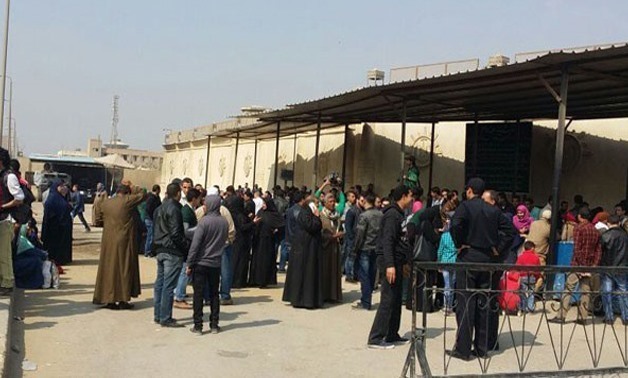
FILE - Pardoned prisoners in Egypt
CAIRO – 3 May 2018: A total of 1004 prisoners got out of jail on Thursday on the occasion of the 36th anniversary of Sinai Liberation, the Ministry of Interior said in a statement.
Egypt's Prison Service usually holds several meetings and committees to determine the prisoners' entitlement to get a presidential pardon; a total of 658 prisoners have met the determined criteria set by the Ministry of Interior to be pardoned, while the remaining 346 inmates got conditional release.
On March 9, 645 prisoners got out of jail in conjunction with Egypt’s Police Day and the January 25 Revolution anniversary.
On February 14, a total of 421 prisoners were released per another presidential pardon.
In October 2016, President Abdel Fatah al-Sisi announced forming a Presidential Pardon Committee, headed by political thinker Osama al-Ghazaly Harb, for pardoning detainees with charges pending further investigation.
Following Sisi’s permission in the World Youth Conference (WYF), the committee announced preparing the fourth pardon list according to the law.
MP Tarek al-Khouly, member of the Presidential Pardon Committee, said on November 11, 2017, that they have been working to finish the list, in order to prove to the whole world that the outcome of the previously held youth conferences is being executed.
President Sisi confirmed that those who are not proven to be members of terrorist organizations or to be involved in acts that contradict the constitutional presidential pardon standards will be on the list, according to Kholy.
Concerning pardoned detainees of the earlier three lists, Khouly said that the committee will contact ministries and specialized foundations to execute plans, qualifying them to regain their freedom.
MP Mohamed al-Ghoul, deputy of Parliament's Human Rights Committee, said that the committee receives pardon petitions from detainees’ families, and that they plan to send them after revision to the presidential committee.
In December 2017, the Egyptian Cabinet approved a bill to amend some provisions of law No. 3396 of 1956, concerning the organization of prisons.
The Parliament is set to continue the discussion of this law’s amendments with the aim of passing it as soon as possible.
This bill makes prisoners eligible for police pardon after serving half their sentence, rather than the current two-thirds of a sentence. The pardon aims to urge the prisoners to pursue proper behavior within the prison and to respond to rehabilitation programs, enabling them to return to normal life as good members of society.
The prisoners will receive a police pardon if their release does not pose a threat to public security.
Article 155 of the Egyptian constitution gives the president the power to pardon or commute the sentence of prisoners following consultations with the Cabinet; on the condition that their offences do not include violence or attacks on public or security properties. The pardon, usually taking place during official and religious holidays, entails:
1. Ending any freedom-restricting penalties.
2. Canceling fine penalties, if applicable.
3. Pardoning the prisoner from police surveillance.
4. The legal effects of the sentence continue to be shown in the criminal record of the released prisoners.

Comments
Leave a Comment